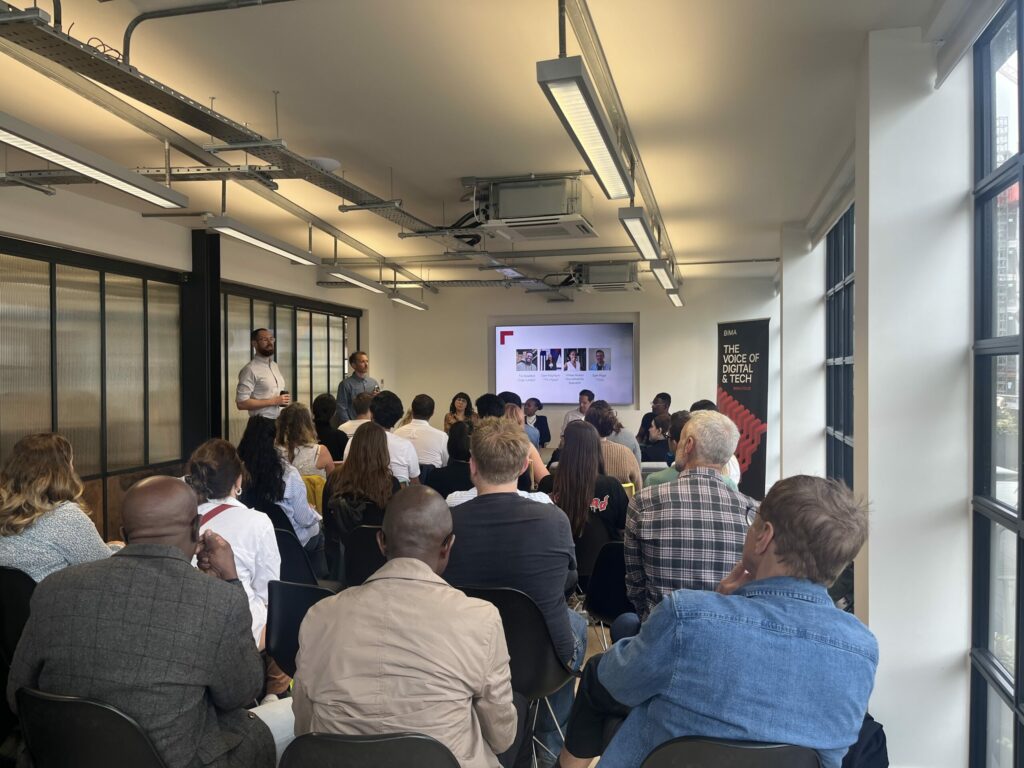
The Power of Neurodiversity in the Workplace
Yesterday morning, Tug hosted BIMA’s latest breakfast event – ‘Great Minds Don’t Think Alike: The Power of Neurodiversity’ – in our London office. The morning had a fantastic turnout – with our Shoreditch hub hosting a keen audience eager to learn more about neurodiversity in the workplace.
The session offered up an impressive panel. Eagle London’s Tai Rosemin played host, encouraging insightful discussions from panelists Gem Fountain (Creative Director at TPXimpact), Vimbai Mukori (Associate Occupational Therapist) and Sam Page (Chief Executive Officer at 7DOTS).
When thinking about neurodiversity, a lot of people might first think of autism. However, neurodiversity encompasses so much more than this – it also includes, but is not limited to, conditions like ADHD, OCD, Dyspraxia and Dyslexia.
Currently, there’s a challenging narrative circulating around overdiagnosis, and that ‘everyone’s diagnosed with something nowadays’. The panelists touched on this misconception, explaining how this instills a negative stigma around neurodiversity, whereby people who could benefit from a diagnosis refrain from getting one. In actuality, those who are neurodiverse make up a small fraction of the population. The British Dyslexia Association claims that only “Ten percent of the population are believed to be dyslexic”1 While approximately 6.8% of adults worldwide have symptomatic ADHD.2
Throughout the discussion, the panelists, who are neurodiverse, shared their experiences on this. Talks ranged from exploring their diagnosis journey to how they navigate their working life. These panelists also discussed the stand-out qualities they bring to the table and furthermore, how we can create a better workplace culture where neurodiverse professionals can thrive.
The talk then pivoted towards how businesses can support their neurodiverse staff members, and further create a culture that allows people to think and interact in different ways – ultimately bringing the best out of their workforce. The panelists suggested some top ideas for this; from making people feel safe identifying themselves as neurodiverse to creating an environment where they feel supported to operate in a way that works best for them, and furthermore, in a way they can do their best work. Transparency is a crucial aspect for this – both in being open with yourself about your own biases, and in being honest when you need guidance on how to properly support your neurodiverse team members.
The conversation also touched on how to navigate neurodiversity throughout the recruitment process. For example, when posting a job description, asking for generic, neurotypical qualities that aren’t actually required for the job may prevent neurodiverse people from applying. This may then prevent employers from being able to explore neurodiverse applicants who might’ve been a great fit for the role.
Here at Tug, we regularly host BIMA’s Cultural Credibility Series, which steer conversations around inclusivity within the digital and tech space. Tug Senior Commercial Manager Alex Gregory commented the following on the event:
“Another eye-opening session with BIMA yesterday, and a brilliant panel as always. Working in digital media, our teams comprise of a great mix of people – both neurodiverse and neurotypical – with a fantastic range of skills.”
“It’s really important for us to understand how differently people’s brains can be wired, and how to accommodate these differences within the agency. This way, everyone can feel included, and we can bring out the best in our team.”
1 British Dyslexia Association, https://www.bdadyslexia.org.uk/dyslexia
2 National Library of Medicine, ‘The prevalence of adult attention-deficit hyperactivity disorder: A global systematic review and meta-analysis’, https://pubmed.ncbi.nlm.nih.gov/33692893/


